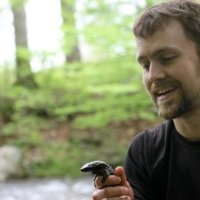 Purdue University - Extension - Forestry and Natural Resources
Purdue University - Extension - Forestry and Natural Resources
Nicholas Burgmeier

Forestry and Natural Resources
Why Extension?
I first worked with the Eastern Hellbender when I had the opportunity to accompany the Indiana DNR state herpetologist on a survey in the Blue River. It was something I had always wanted to see! A few years later, while working as the herpetologist’s technician for the Indiana DNR, a M.S. project focused on Eastern Hellbender biology in the Blue River was advertised, I applied, and I then got to work with them for the next three years. It turned out that my project was the first part of a much larger project focused on restoring the hellbender throughout its former habitat in Indiana.
Many people ask, “what good is it and why should we care?” This is a difficult question to answer and there is no one size fits all response for everyone. Hellbenders are a very important indicator of water quality, and if their numbers start to decline then it is likely there is a water quality issue, which is relevant to everyone. From an ecological standpoint, hellbenders are thought to play a major role in regulating crayfish populations. The loss of hellbenders could have a cascade effect throughout a river’s ecosystem. A third thing to consider is that hellbenders, as a species, have been around for nearly 2 million years, far longer than modern humans, and there are no do-overs concerning species extinction.
Publications
-
The Nature of Teaching: Adaptations for Aquatic Amphibians
-
How Our Zoos Help Hellbenders
-
Indiana Amphibian and Reptile ID Package
-
Help the Hellbender, North America's Giant Salamander
Videos
-
Adaptations for Aquatic Amphibians Activity 2: Water Quality Sneak Peak
-
Improving Water Quality by Protecting Sinkholes on Your Property